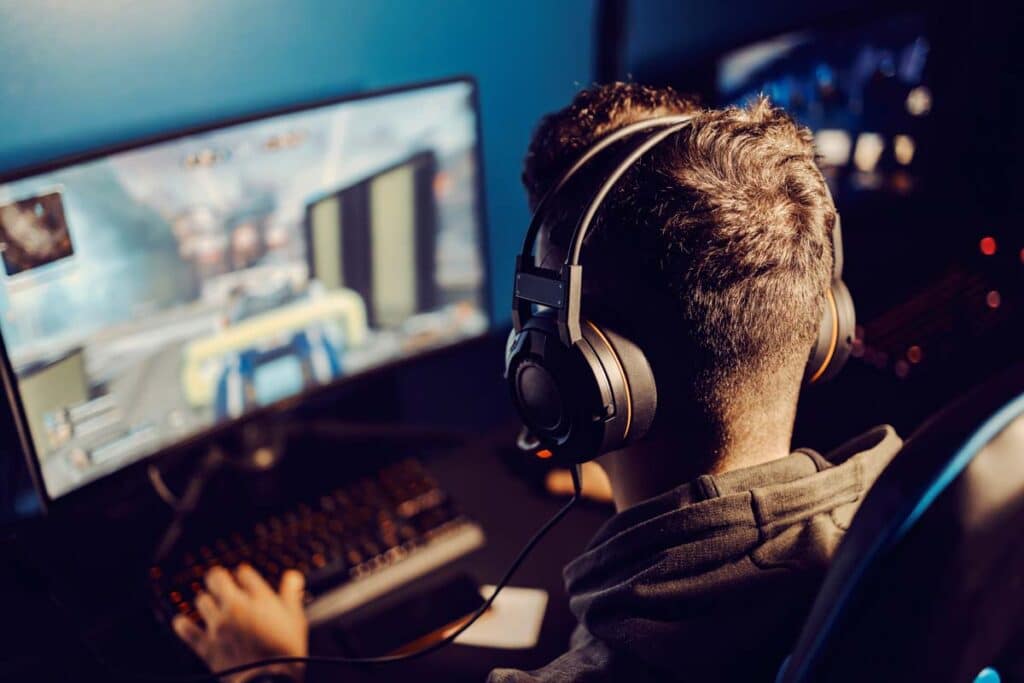
Update:
- A man who alleges gaming companies intentionally got users addicted to their games as a way to boost profits removed Nintendo of America Inc. and Epic Games Inc. from his class action lawsuit.
- In an order filed Oct. 10 in a Georgia federal court, gamer Andrew Sayers dropped the two companies from the class action lawsuit. He continues to pursue claims against other leading video game companies, including Microsoft, Activision Blizzard and Roblox.
- All of the companies asked the court to drop the claims against them, arguing they are shielded by the First Amendment, which protects their role in making the games available and, in the case of developers, forbids the censorship of video games “solely to protect the young from ideas or images.”
- Sayers, who claims to suffer from video game addiction, argues the companies intentionally created addictive video games to get young people to spend more time and money playing them, harming their mental health.
Nintendo, Microsoft video game addiction lawsuit overview:
- Who: Plaintiff Andrew Sayers filed a video game addiction lawsuit against Microsoft Corp., Nintendo of America Inc. and other game developers.
- Why: The lawsuit alleges the companies intentionally create addictive games and monetization schemes to get young people to spend more time and money playing video games.
- Where: The Microsoft and Nintendo lawsuit was filed in Georgia federal court.
(May 2, 2024)
Microsoft Corp., Nintendo of America Inc., Rockstar Games Inc. and other video game developers intentionally create addictive games to increase their profits, according to a recent Microsoft lawsuit filed by a plaintiff allegedly suffering from video game addiction.
Plaintiff Andrew Sayers, 23, claims video game addiction is a worldwide epidemic harming our nation’s youth and young adults and has negatively affected his life.
Sayers says he spends approximately five to nine hours each day playing games, such as Fortnite, Minecraft, Call of Duty and Grand Theft Auto, on his Nintendo and Xbox devices. He says he first began playing video games when he was 10 years old.
He has “continued to play video games at an increasing and uncontrollable pace since that time,” according to the Nintendo and Microsoft lawsuit.
Sayers claims video game addiction to the defendants’ products has caused him to suffer from brain damage, gamer’s rage, emotional distress, behavioral issues, trouble focusing at school, dropping grades and withdrawal symptoms.
He also alleges he has been diagnosed with anxiety and depression and his attention deficit hyperactivity disorder has worsened because of his video game addiction. The severity of these harms required outpatient counseling and private tutoring, the lawsuit claims.
Nintendo, Microsoft lawsuit says game developers target youth with monetization schemes
The video game industry’s recent growth is allegedly due to patented monetization schemes targeting minors by enticing them to make in-game purchases of downloadable products, the lawsuit alleges.
These in-game purchases often take the form of microtransactions that are low in price, but players are often required to make multiple purchases to advance in the game, the Nintendo lawsuit says. Game developers offer microtransactions in a manner designed to extend gameplay and “increase a player’s dopamine levels behind paywalls,” Sayers alleges.
The video game developers and publishers rely on minors and young adults becoming addicted to their video games because they will log more hours on the games and spend more money on in-game purchases, Sayers alleges.
The lawsuit says the ultimate goal for video game developers is for the revenue from microtransactions to outweigh the revenue of one-time-purchase games. Sayers claims youth and young adults are the most vulnerable to these manipulative monetization schemes.
The Nintendo and Microsoft lawsuit asserts claims including negligence, strict liability, fraudulent misrepresentation and intentional infliction of emotional distress.
Consumers recently hit the makers of Fortnite with a class action lawsuit alleging they invade children’s privacy by collecting their personal information without their parents’ consent.
Have you or a loved one struggled with video game addiction? Tell us your story in the comments.
Sayers is represented by Paul W. Painter III of Bowen Painter Trial Lawyers, Tina Bullock of Bullock Ward Mason LLC and Richard Meadow of The Meadow Law Firm LLC.
The Nintendo and Microsoft video game addiction lawsuit is Andrew Sayers v. Microsoft Corp., et al., Case No. 4:24-cv-00078, in the U.S. District Court for the Southern District of Georgia, Savannah Division.
Don’t Miss Out!
Check out our list of Class Action Lawsuits and Class Action Settlements you may qualify to join!
Read About More Class Action Lawsuits & Class Action Settlements:















94 thoughts onPlaintiff removes Nintendo, Epic from video game addiction lawsuit
Please add me to this case. I qualify
Add me
I am currently addicted to Solitaire Cash and spend hours playing it when I should be sleeping, not to mention the money I have wasted on it! I play it every night! It’s advertised as a game that you can make $83.00 every day, but I have NEVER made $83.00 in one day
My daughter been playing since she was 9 year’s old. She’s so lost to the world because she wasted her whole life in her room to we’re she became depressed really bad in lost herself. She was in it so much that she we’re glasses to see. It’s very hard to still get her off now.
I’m extremely addicted to video games i still play nintendo and lots of others I’m always late for everything i have to do because i am trying to just finish the round but then it automatically starts the next round and i am stuck again. I actually lost a couple jobs and a couple relationships too to excessive video gaming